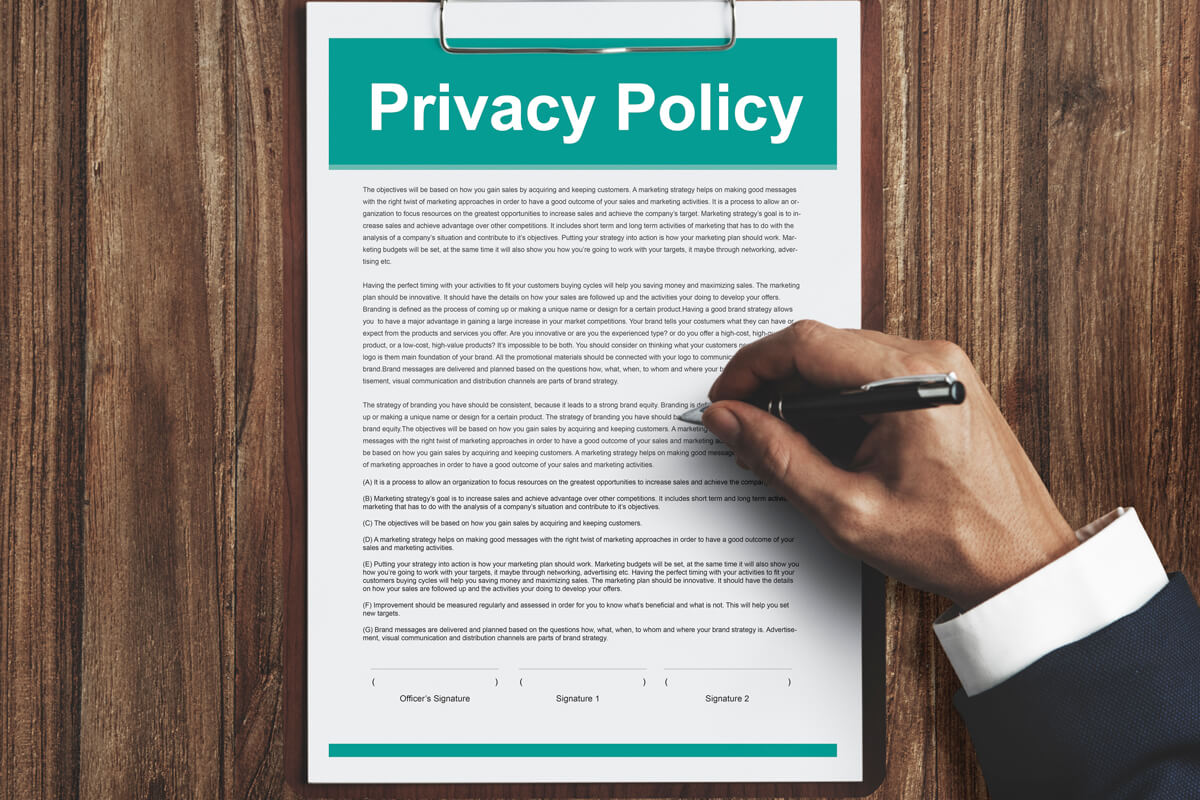Security measures. Grayed-out, tiny links at the bottom of web pages come to mind when you hear this term. These legal documents are one of the most important documents on any website, yet it is routinely disregarded. As part of a comprehensive strategy to ensure your website complies with local, state, and federal laws, website policies are an important component that should be addressed.
Therefore, what are website policies, and why are they necessary?
Website privacy policies are legally binding documents that detail the website’s data collection, processing, storage, sharing, and protection practices, as well as the site’s and its users’ purposes for collecting, using, disclosing, and protecting users’ personal information. All websites engage with visitors and gather information about them. Personal data, including names, email addresses, IP addresses, session activity, and payment details, is collected by most websites. For this reason, it is important to have website policies to safeguard your business and visitors’ personal information and ensure that your website meets all applicable legal requirements.
Are website policies necessary?
By now, it should be evident that website policies are important. As previously stated, all websites interact with user data in one way or another. Therefore, if you have a website and want people to visit it, you must disclose your privacy practices to them. By law, you must give users detailed information about the data you collect and how it will be used, stored, and safeguarded. In fact, under the new EU GDPR legislation (enforceable as of May 2018), it is also required that your privacy policy inform users of their rights about their data. Information provided must be clear, straightforward, complete, and up-to-date. Significant penalties may be imposed for noncompliance with applicable regulations (Article 83). All businesses and organizations (even charities) that deal with EU residents in any way (data access, product, or service provision) must comply with these rules. Many third-party apps and services necessitate a privacy policy, and having one is essential for meeting legal requirements and keeping customers’ trust. Google is an example. Google requires a detailed and up-to-date privacy policy on your website before you can use certain services and tools (including AdSense, Google Analytics, etc.).
An excerpt from Google Analytics’s terms of service goes as follows:
To collect traffic data, “You must post a Privacy Policy and that Privacy Policy must provide notice of Your use of cookies,” and “You must not circumvent any privacy features (such as an opt-out) that are part of the Service.”
How do I draft my website policies?
You can draft your website policies using any of the following approaches:
1. Do it yourself with the help of a free sample
Though it is risky and not recommended, you can try to write your website policies using the above information on legal requirements as a starting point (ideally, you should research the applicable laws yourself); you should be able to find a basic template online that you can tweak to include the various clauses that apply to your business. Remember that there is no absolute assurance that you are fulfilling requirements or that the information is stated correctly using this method. The other drawback is that you will have to change the language or update the policy by yourself.
2. Getting a lawyer
You can rest assured that you will have access to a professionally contracted and tailored policy if you go this route, so long as you have the financial means to do so. Find an attorney specializing in international data protection law, and ensure they are up-to-date on the rules before hiring them. Both the initial investment and the ongoing price of this strategy need to be taken into account. Legal representation can be expensive, and you may also have to pay to translate or update the policy.

3. Using a web-based generator.
This choice is interesting because its practicality relies heavily on the standard of the generator employed. It’s essential to be aware that many online generators rehash the same generic clauses found in online templates, leaving you vulnerable to the same threats discussed above. The most important thing to look for in a generator is a service that provides customizable options supported by demonstrable legal knowledge. And this is where the Termageddon comes in handy. It’s reasonably priced, crafted by lawyers, scalable, and self-updating. This is preferable to hiring a lawyer because their attorneys have drafted it under the most stringent international legislation.
In addition, when you register from this link, you get ten percent off your first-year payment. Also, tell your referrals to enter promo code TOMORROW at checkout when they begin their subscription.
How do I incorporate my website policies into my website?
Whether you drafted the policy yourself or had it done by an outside attorney, you must make a page on your website and paste it there. If you’re working with a content management system, copy and paste the policy into a new page, give it a descriptive title, and hit “publish.” The next step is adding the new page as a text link to your primary or footer navigation (you can add a button, but the process is a bit more complicated). To abide by the rules, the link must appear on every page. If, on the other hand, you used a generator, you can expect multiple export choices for the generated code. Once you’ve exported your data, you can paste it into a text widget or activate your Global Footer to incorporate it into the latter. This method will likely work. The Termageddon generator makes it simple to set up. Learn more about how Termageddon works here.
Get your website policies to be on the safer side today.
If you can afford it, you should hire a lawyer specializing in privacy law to draft your website’s policies, keep track of changes to privacy laws, and update the policies as necessary. Termageddon is an excellent alternative to hiring a private lawyer to review your website’s policies if you don’t have the funds for one. This policy generator is all-inclusive, meaning it will automatically update your site’s policies whenever there is a change in privacy regulations or the introduction of new rules. Termageddon was founded by an attorney specializing in privacy and contracts, and the company has been recognized as a trusted technology vendor by the world’s largest international privacy organizations. A license for Termageddon can be purchased for $10 per month or $99 per year. With your own Termageddon account, you’ll have complete access to your policies and receive email notifications whenever there are any policy updates, new disclosures, or other legal requirements.
Security measures. Grayed-out, tiny links at the bottom of web pages come to mind when you hear this term. These legal documents are one of the most important documents on any website, yet it is routinely disregarded. As part of a comprehensive strategy to ensure your website complies with local, state, and federal laws, website policies are an important component that should be addressed.
Therefore, what are website policies, and why are they necessary?
Website privacy policies are legally binding documents that detail the website’s data collection, processing, storage, sharing, and protection practices, as well as the site’s and its users’ purposes for collecting, using, disclosing, and protecting users’ personal information. All websites engage with visitors and gather information about them. Personal data, including names, email addresses, IP addresses, session activity, and payment details, is collected by most websites. For this reason, it is important to have website policies to safeguard your business and visitors’ personal information and ensure that your website meets all applicable legal requirements.
Are website policies necessary?
By now, it should be evident that website policies are important. As previously stated, all websites interact with user data in one way or another. Therefore, if you have a website and want people to visit it, you must disclose your privacy practices to them. By law, you must give users detailed information about the data you collect and how it will be used, stored, and safeguarded. In fact, under the new EU GDPR legislation (enforceable as of May 2018), it is also required that your privacy policy inform users of their rights about their data. Information provided must be clear, straightforward, complete, and up-to-date. Significant penalties may be imposed for noncompliance with applicable regulations (Article 83). All businesses and organizations (even charities) that deal with EU residents in any way (data access, product, or service provision) must comply with these rules. Many third-party apps and services necessitate a privacy policy, and having one is essential for meeting legal requirements and keeping customers’ trust. Google is an example. Google requires a detailed and up-to-date privacy policy on your website before you can use certain services and tools (including AdSense, Google Analytics, etc.).
An excerpt from Google Analytics’s terms of service goes as follows:
To collect traffic data, “You must post a Privacy Policy and that Privacy Policy must provide notice of Your use of cookies,” and “You must not circumvent any privacy features (such as an opt-out) that are part of the Service.”
How do I draft my website policies?
You can draft your website policies using any of the following approaches:
1. Do it yourself with the help of a free sample
Though it is risky and not recommended, you can try to write your website policies using the above information on legal requirements as a starting point (ideally, you should research the applicable laws yourself); you should be able to find a basic template online that you can tweak to include the various clauses that apply to your business. Remember that there is no absolute assurance that you are fulfilling requirements or that the information is stated correctly using this method. The other drawback is that you will have to change the language or update the policy by yourself.
2. Getting a lawyer
You can rest assured that you will have access to a professionally contracted and tailored policy if you go this route, so long as you have the financial means to do so. Find an attorney specializing in international data protection law, and ensure they are up-to-date on the rules before hiring them. Both the initial investment and the ongoing price of this strategy need to be taken into account. Legal representation can be expensive, and you may also have to pay to translate or update the policy.

3. Using a web-based generator.
This choice is interesting because its practicality relies heavily on the standard of the generator employed. It’s essential to be aware that many online generators rehash the same generic clauses found in online templates, leaving you vulnerable to the same threats discussed above. The most important thing to look for in a generator is a service that provides customizable options supported by demonstrable legal knowledge. And this is where the Termageddon comes in handy. It’s reasonably priced, crafted by lawyers, scalable, and self-updating. This is preferable to hiring a lawyer because their attorneys have drafted it under the most stringent international legislation.
In addition, when you register from this link, you get ten percent off your first-year payment. Also, tell your referrals to enter promo code TOMORROW at checkout when they begin their subscription.
How do I incorporate my website policies into my website?
Whether you drafted the policy yourself or had it done by an outside attorney, you must make a page on your website and paste it there. If you’re working with a content management system, copy and paste the policy into a new page, give it a descriptive title, and hit “publish.” The next step is adding the new page as a text link to your primary or footer navigation (you can add a button, but the process is a bit more complicated). To abide by the rules, the link must appear on every page. If, on the other hand, you used a generator, you can expect multiple export choices for the generated code. Once you’ve exported your data, you can paste it into a text widget or activate your Global Footer to incorporate it into the latter. This method will likely work. The Termageddon generator makes it simple to set up. Learn more about how Termageddon works here.
Get your website policies to be on the safer side today.
If you can afford it, you should hire a lawyer specializing in privacy law to draft your website’s policies, keep track of changes to privacy laws, and update the policies as necessary. Termageddon is an excellent alternative to hiring a private lawyer to review your website’s policies if you don’t have the funds for one. This policy generator is all-inclusive, meaning it will automatically update your site’s policies whenever there is a change in privacy regulations or the introduction of new rules. Termageddon was founded by an attorney specializing in privacy and contracts, and the company has been recognized as a trusted technology vendor by the world’s largest international privacy organizations. A license for Termageddon can be purchased for $10 per month or $99 per year. With your own Termageddon account, you’ll have complete access to your policies and receive email notifications whenever there are any policy updates, new disclosures, or other legal requirements.






